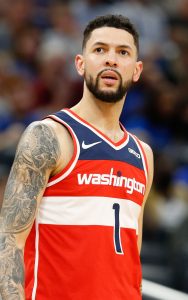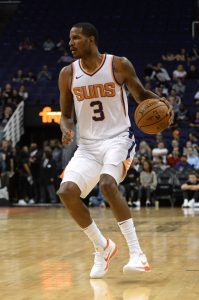Appearing on Howard Beck’s podcast, The Full 48, NBA commissioner Adam Silver addressed a handful of issues facing the league, weighing in on the Suns‘ arena situation, the NBA’s draft lottery, and the league’s marijuana policy, among other topics.
Here are some of the highlights from the discussion:
On the Suns’ arena situation and the concept of relocation in general:
- Silver says he has made it clear that it’d be a “failure” on his part if an NBA team moves out of its current market, and he doesn’t expect that to happen with the Suns. “If I can be helpful, I will be to all parties there,” Silver said, referring to the Suns and the Phoenix City Council. “But I’m pretty confident they’re going to sit down and work out a deal.”
[RELATED: Robert Sarver: Suns won’t move out of Phoenix] - In the Suns’ case, the issue will come down to how much money the city is willing to put toward those renovations to Talking Stick Resort Arena. Silver, referring to arenas as “modern-day town halls,” argues that a public/private funding partnership makes sense because NBA games make up only a fraction of the events that take place at those arenas.
- Silver points out that Phoenix’s arena is the oldest one in the NBA that hasn’t been either rebuilt or renovated over the years, adding that it’s in need of an upgrade.
On the draft lottery:
- It’s still “unclear” how effective the NBA’s changes to the draft lottery will be, according to Silver, who cautions that he views the recent tweaks as an incremental improvement rather than a “cure-all.”
- The NBA is constantly looking for ways to improve its system, but unless the league is willing to take drastic measures to revamp how teams can acquire players coming into the NBA (ie. abolishing the lottery or the draft itself), there’s only so much that can be done to adjust the format, says Silver.
- The commissioner also tells Beck that he’s unconvinced that “tanking” for multiple years is the best way to go about rebuilding, given the toll it takes on a team’s culture and fan base.
- Silver referred to “The Wheel,” an idea from Celtics executive Mike Zarren which would see a team rotate through all 30 draft positions over 30 years, with those positions set well in advance. However, Silver suggests it’d be a bad look for the league for championship teams to end up with top picks, given the fan outrage when the Warriors signed DeMarcus Cousins this past offseason.
On the NBA’s marijuana ban:
- The NBA is having ongoing discussions with the players’ union about the league’s rules surrounding marijuana, according to Silver. “I don’t want to speak for [union head] Michele Roberts, but I think she and I have a somewhat similar view on this, which is we should follow the science,” Silver said. “This is not an ethical issue for me. It’s not a moral issue for me. I obviously see what’s happening in states around America. I think there’s a bunch of unique issues for the NBA.”
- The fact that various states across the country have different regulations and rules regarding marijuana use makes things trickier for the NBA, according to Silver, who points out that there are still federal laws prohibiting traveling with marijuana.
- Silver also notes that the league’s marijuana ban may – in some cases – result in players turning to alcohol or prescription drugs, which might actually be worse for the player that marijuana would be.
- Ultimately, the NBA wants more input from experts before making any changes, but Silver acknowledges that the league may eventually alter its position.
On changing the NBA’s entry age:
- Silver reiterates that the earliest the NBA would change its entry age would be for the 2022 draft, which has been previously reported.
- Silver views 2022 as a reasonable target for those changes if the NBA and players’ union can get something done within “the next few months.” If there’s no significant progress in those talks by the time the 2019 draft is approaching, the timeline may need to be pushed back further, says Silver.
- In concert with the negotiations on the NBA’s entry age, the league will likely be looking to create regulations about the availability of prospects’ medical information during the pre-draft process — Silver would like to see all teams have equitable access to that info, as opposed to top prospects withholding it from specific clubs.
- Silver believes the NBA G League will get up to 30 teams within “the next two years or so.” Currently, 27 clubs have NBAGL affiliates.

